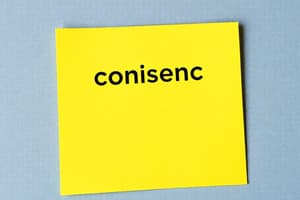Podcast
Questions and Answers
Which of the following is NOT a factor affecting data collection according to the text?
Which of the following is NOT a factor affecting data collection according to the text?
- Use of language
- Timing
- Bias
- Sample size (correct)
What does the text state about the cost of data collection?
What does the text state about the cost of data collection?
- The cost is always affordable regardless of the data collection method
- The cost is only a factor for printing questionnaires, not for paying data collectors
- The cost is not a factor to consider
- The cost must be taken into account, as it may be more than can be afforded (correct)
Which of the following is a potential source of bias during data collection?
Which of the following is a potential source of bias during data collection?
- Respondents' level of education
- Respondents' gender
- Respondents' age
- The way questions are asked or information is gathered (correct)
What does the text suggest about the timing of data collection?
What does the text suggest about the timing of data collection?
Which of the following is an ethical consideration in data collection?
Which of the following is an ethical consideration in data collection?
What does the text state about the use of language in data collection?
What does the text state about the use of language in data collection?
What is the primary purpose of using a focus group?
What is the primary purpose of using a focus group?
Which of the following is NOT a characteristic of a focus group moderator?
Which of the following is NOT a characteristic of a focus group moderator?
What is the main advantage of using focus groups as a data collection method?
What is the main advantage of using focus groups as a data collection method?
How do focus groups differ from laboratory observations?
How do focus groups differ from laboratory observations?
What is the main purpose of using observation as a data collection method?
What is the main purpose of using observation as a data collection method?
Which of the following is NOT a characteristic of homogeneous focus groups?
Which of the following is NOT a characteristic of homogeneous focus groups?
Which type of interview is most susceptible to subjective bias or error?
Which type of interview is most susceptible to subjective bias or error?
In a structured interview, what is the characteristic of how the questions are presented?
In a structured interview, what is the characteristic of how the questions are presented?
What is the primary purpose of qualitative interviews?
What is the primary purpose of qualitative interviews?
Which type of interview is characterized by having a format or a few predetermined questions, while allowing new ideas to be brought up during the interview?
Which type of interview is characterized by having a format or a few predetermined questions, while allowing new ideas to be brought up during the interview?
What is one advantage of telephone interviews compared to mail surveys or personal interviews?
What is one advantage of telephone interviews compared to mail surveys or personal interviews?
Which type of interview is better suited for collecting sensitive data from respondents?
Which type of interview is better suited for collecting sensitive data from respondents?
What is the primary purpose of a focus group?
What is the primary purpose of a focus group?
What is the role of the moderator in a focus group?
What is the role of the moderator in a focus group?
How are participants selected for a focus group?
How are participants selected for a focus group?
What is the typical size of a focus group?
What is the typical size of a focus group?
Which of the following statements about focus groups is incorrect?
Which of the following statements about focus groups is incorrect?
Which of the following is NOT a characteristic of an aptitude test?
Which of the following is NOT a characteristic of an aptitude test?
Which of the following personality inventories is used to determine an individual's introversion or extroversion?
Which of the following personality inventories is used to determine an individual's introversion or extroversion?
What is the purpose of using concept scales in a survey?
What is the purpose of using concept scales in a survey?
Which of the following is the LEAST desirable outcome when designing a survey?
Which of the following is the LEAST desirable outcome when designing a survey?
Which of the following is the recommended approach for organizing survey questions?
Which of the following is the recommended approach for organizing survey questions?
What is the purpose of using response scales in a survey?
What is the purpose of using response scales in a survey?
Flashcards are hidden until you start studying
Study Notes
Factors Affecting Data Collection
- Cost of data collection is a significant factor
- Timing of data collection is important, as it can impact the accuracy and relevance of the data
Sources of Bias
- Potential sources of bias during data collection include interviewer bias and language bias
Focus Groups
- Primary purpose of using a focus group is to gather qualitative data through group discussions
- Characteristics of a focus group moderator include neutrality, active listening, and guiding the discussion
- Main advantage of using focus groups is that they allow for in-depth and spontaneous discussion
- Focus groups differ from laboratory observations in that they involve group discussions rather than individual behavior
- Homogeneous focus groups consist of participants with similar characteristics
Interviews
- Structured interviews involve presenting questions in a standardized and predetermined format
- Primary purpose of qualitative interviews is to gather in-depth and detailed information
- Semi-structured interviews involve having a format or a few predetermined questions, while allowing new ideas to be brought up during the interview
- Telephone interviews are advantageous in terms of cost and response rate, compared to mail surveys or personal interviews
- In-depth interviews are better suited for collecting sensitive data from respondents
Focus Group Moderation
- Role of the moderator is to guide the discussion, ensure active participation, and maintain neutrality
- Participants are selected based on specific criteria, such as demographics or experiences
- Typical size of a focus group is 6-12 participants
Survey Design
- Concept scales are used to measure complex concepts or attitudes
- Least desirable outcome when designing a survey is respondent fatigue
- Recommended approach for organizing survey questions is to start with general questions and move to specific ones
- Purpose of using response scales is to quantify respondent attitudes or opinions
Studying That Suits You
Use AI to generate personalized quizzes and flashcards to suit your learning preferences.




